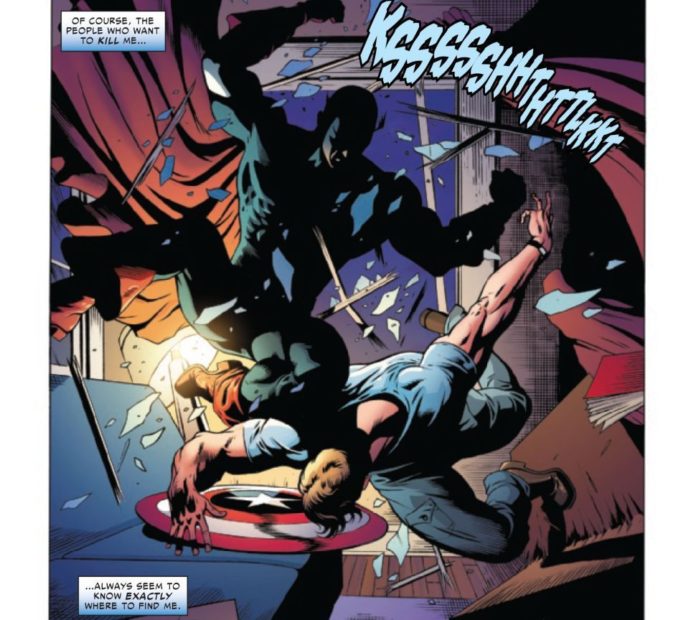It’s Captain America’s 80th Anniversary! Happy Birthday, Steve Rogers.
In celebration, Marvel has decided to spread the love around. In the new series United States of Captain America, the likes of former and current Captains like Steve Rogers, Sam Wilson, and Bucky Barnes rub shoulders with a whole new crew of diverse Captains America from across the nation.
What does Captain America stand for in 2021? More than one person, certainly.
Who is making The United States of Captain America #1?
The debut issue of the miniseries is split between two stories and creative teams. The first, focusing on Steve Rogers and Sam Wilson, is from writer Christopher Cantwell (Iron Man, Halt and Catch Fire) and artist Dale Eaglesham (Iron Man, Shazam!).
The second, spotlighting new Captain America Aaron Fischer, is from Marvel newcomer Josh Trujilo (Be Gay, Do Comics, Dodge City) and artist Jan Bazaldua (X-Force, Star Wars). As queer comics creators themselves, Trujilo and Bazaldua help give some weight and authenticity to what could otherwise be cloying and performative: The origin story of a gay “Captain America.”
What is The United States of Captain America #1 about?
It’s about the meaning of Captain America — as a symbol — in a world where America is less of a beacon of hope and justice than ever before in recent memory. The opening scene, an incredible monologue from Steve Rogers about the rotten core of the American Dream as we know it, sets the tone for a biting, modern exploration of everyone’s favorite flag-draped hero. Frustratingly, the rest of the issue feels comparatively toothless compared to that first bite.
The issue’s action begins when a shadowy figure, wearing a retro Captain America outfit, jumps Steve in his own home and steals his shield. The assailant doesn’t have a single line of dialogue throughout the whole tale, leaving only a vague idea of why this whole situation is happening to begin with. It’s a shadowy threat that’s too shadowy.
Image: Jan Bazaldua/Marvel Comics
Things improve once Steve and Sam run into Aaron Fischer, the Captain America of the Railways, a scruffy, gay, homeless runaway who protects the downtrodden and lost. He injects a bit of life into the story, but can’t quite recapture the spark of those opening pages.
Why is The United States of Captain America #1 happening now?
Well, there is the whole 80th anniversary thing.
But it could also boil down to another timely reason: Steve Rogers isn’t Captain America in the Marvel Cinematic Universe anymore. After the events of Falcon and the Winter Soldier, Sam Wilson is sporting the stars and stripes in the movie-verse, and is even getting his own Captain America movie. The MCU is the best advertisement for Marvel Comics that’s ever been, so long as Marvel Comics can keep its stories looking like they reflect the MCU.
While the motivations may be a bit cynical, credit where it is due to United States of Captain America, for recruiting appropriate creative teams to tell these new Captain’s stories. The Aaron Fischer-led B-story is written and drawn by a gay man and trans woman, respectively. Subsequent issues will feature similarly diverse creative teams to match the origin stories of each issue’s new Captains America. If USofCA is Marvel retooling Captain America for modern audiences, at least the right people are getting to take a crack at it.
Is there any required reading?
Not really! Ta-Nehisi Coates’ delay-plagued run on Captain America concludes on July 7th with Captain America #30, and that series certainly isn’t the worst thing you could read beforehand.
Similar to the fantastic opening scene of USofCA, Coates’ run makes many pointed jabs at everything from the de-facto American oligarchy to comparing Red Skull to YouTube aggravators like Jordan Peterson. But as far as required reading? You can go in blind and be just fine.
Is The United States of Captain America #1 good?
It’s not bad, but I wouldn’t venture to call it good. As I mentioned previously, the opening segment is the strongest portion of the book and sets the stage for a story that is never really delivered. The issue begins with a biting critique of American Imperialism, the use of “The American Dream” as a bludgeon to ostracize those who don’t fit within a narrow definition of that dream, and our history of fighting anyone — even fellow Americans — who would challenge this system. But the action is largely just a pretty standard superhero story.
:no_upscale()/cdn.vox-cdn.com/uploads/chorus_asset/file/22691838/kSeun9wjX5PgSBVjvEdeCU_970_80.jpeg)
:no_upscale()/cdn.vox-cdn.com/uploads/chorus_asset/file/22691838/kSeun9wjX5PgSBVjvEdeCU_970_80.jpeg)
Image: Christopher Cantwell, Dale Eaglesham/Marvel Comics
The Aaron Fischer backup tale helps keeps things afloat, but still fails to deliver what you would hope for from a scrappy gay runaway Captain America. He’s heroic, and his clashes with Roxxon are grounded in some real-world struggles, but he just doesn’t have any teeth. He never gets angry, he never gets loud.
I can’t speak for every queer person, nor would I want to, but if I were an 19 year-old, unhomed-due-to-familial-homophobia queer kid who started punching corporate goons, I’d probably have a lot more pointed things to say about it than wanting to be a “promise of hope for the future.” Hell, I do now as a 29-year old gratefully homed trans lady.
Paired with the lack of any substantive follow-up from Steve’s surprisingly harsh look at the nature of what America has developed into, it leaves United States of Captain America #1 feeling like a book that wants to be far more relevant and fiery than it actually is. With new Captains on the way ranging from a member of the Kickapoo Tribe to a Filipino-American College Student, hopefully future issues will have more luck living up to this debut’s promise.
One panel that popped
:no_upscale()/cdn.vox-cdn.com/uploads/chorus_asset/file/22691815/IMG_DE2143465B90_1.jpeg)
:no_upscale()/cdn.vox-cdn.com/uploads/chorus_asset/file/22691815/IMG_DE2143465B90_1.jpeg)
Image: Christopher Cantwell, Dale Eaglesham/Marvel Comics
As unexciting as Steve Rogers brooding in a window may seem, it’s the start of some of his best quiet character work in decades.







